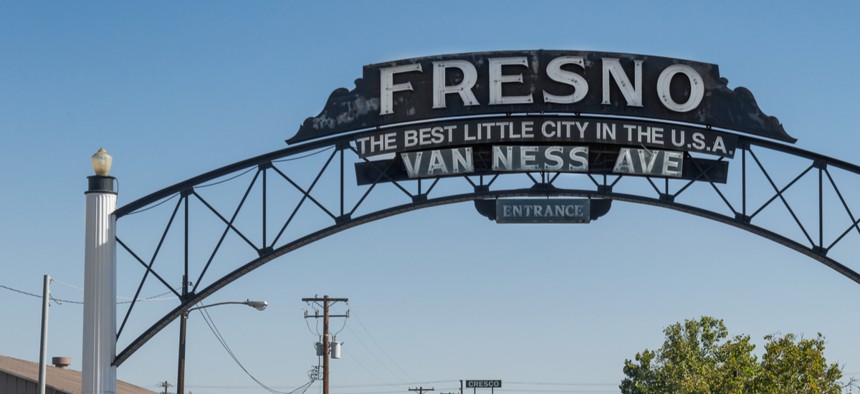Fresno Officials Offer Amazon an Unusual Set of Keys to the City

Welcome to Fresno Shutterstock
As Chicago dangles $1.32 billion in personal income tax diversions in hopes to land the HQ2, a bid from California's fifth-largest city promises something very different.
SEATTLE — As Amazon.com Inc. weighs the various proposals it received this fall from 238 North American cities and metro areas for the company's sought-after second headquarters campus, the world's third-largest retailer has been playing most of its cards close to vest.
The hopeful local governments, however, are subject to public records requests.
Here in Amazon's hometown, Seattle Times columnist Danny Westneat this weekend looked at 30 of the proposals that have surfaced thus far, highlighting a handful of the notable incentives suitors are promising in order to land the so-called HQ2 and the approximately 50,000 employees that are supposed to come with it.
Those includes things you'd normally expect in a local economic development tool kit like free land and various tax exemptions. Then there are more unusual incentives.
Chicago's bid, as Westneat points out, includes $1.32 billion in "personal income-tax diversions" through the Economic Development for a Growing Economy Tax Credit Program , something the Chicago Reader describes as a " program in which the state essentially lets a corporation keep the income tax dollars that its employees would normally pay to the state ."
Then there's the proposal from Fresno, California, which Westneat assesses is the "most far-reaching offer." But it's one that doesn't come with any tax breaks. Instead, Fresno would give Amazon the keys to unlock access to some of the city's decisionmaking.
As Westneat writes:
Fresno promises to funnel 85 percent of all taxes and fees generated by Amazon into a special fund. That money would be overseen by a board, half made up of Amazon officers, half from the city. They’re supposed to spend the money on housing, roads and parks in and around Amazon.
The proposal shows a park with a sign: “This park brought to you by Amazon,” with the company’s smiling arrow corporate logo.
“The community fund projects would give Amazon credit for the funding of each project,” the proposal says. “The potential negative impacts from a project would be turned into positives, giving Amazon credit for mitigating it.”
Los Angeles Times columnist Michael Hiltzik offered up a similar assessment of Fresno’s bid last month , calling it “a uniquely intelligent and innovative proposal”:
The source of the fund would be the gain in property tax revenue flowing from Amazon-controlled property as it increased in value. But instead of flowing into Amazon's corporate pockets—and how much difference does $2 billion or even $7 billion really make to a corporation with annual revenue of $136 billion?—the money gets put to use for the benefit of the company, its employees and its neighbors.
It'd be an unusual arrangement in the very least—and one that would raise important questions about the influence of a private-sector entity like Amazon in shaping local policy and decisionmaking—but with limited fiscal resources to sweeten the pot like some cities, it's what Fresno has to work with in what's still very likely an uphill climb to land the HQ2.
“Our chances are slim … but if we don’t step to the plate, we can’t get a swing,” Mayor Lee Brand said in October, according to The Fresno Bee . If Amazon somehow picks Fresno, it'd be a very interesting case study both in the history of U.S. company towns and in modern-day municipal management.
At this stage in the game, it's hard to know whether Fresno's special community fund for Amazon is of any interest. California's fifth-largest city may be more enticing for Amazon for other reasons. That includes a lower cost of living and housing costs compared to larger West Coast metro areas, direct flights to Amazon’s current Seattle headquarters and the prospect of being an hour train ride away from San José and the heart of Silicon Valley via the first phase of the California High Speed Rail line currently under construction in the Central Valley.
In January, Route Fifty featured the main elements of Fresno's local economic development efforts , including ongoing downtown revitalization .
What does the city have to offer? “Some of it’s probably just cost of living,” said Aaron Blair, the Downtown Fresno Partnership’s president and CEO. “And some of it’s the thought of the high-speed rail project connecting us more to Silicon Valley.”
Blair also noted that from Fresno there’s easy access to the Sierra Nevada mountains and Yosemite National Park, where outdoor recreation opportunities abound. And that the city does not have the kinds of commutes that can bedevil people in bigger metropolitan regions.
“When you really sit back and take a look at it,” Blair said, “people are going, ‘oh wow, I could live a lot better life in Fresno, instead of sitting in my car for hours.’”
Time will tell where Amazon's physical footprint will be growing. In the near term, we're now getting a better picture of just how far some civic stakeholders are willing to bend in the name of economic development.
Michael Grass is Executive Editor of Government Executive's Route Fifty and is based in Seattle.
NEXT STORY: Why It’s Hard to Control Drug Prices at the Ballot Box






